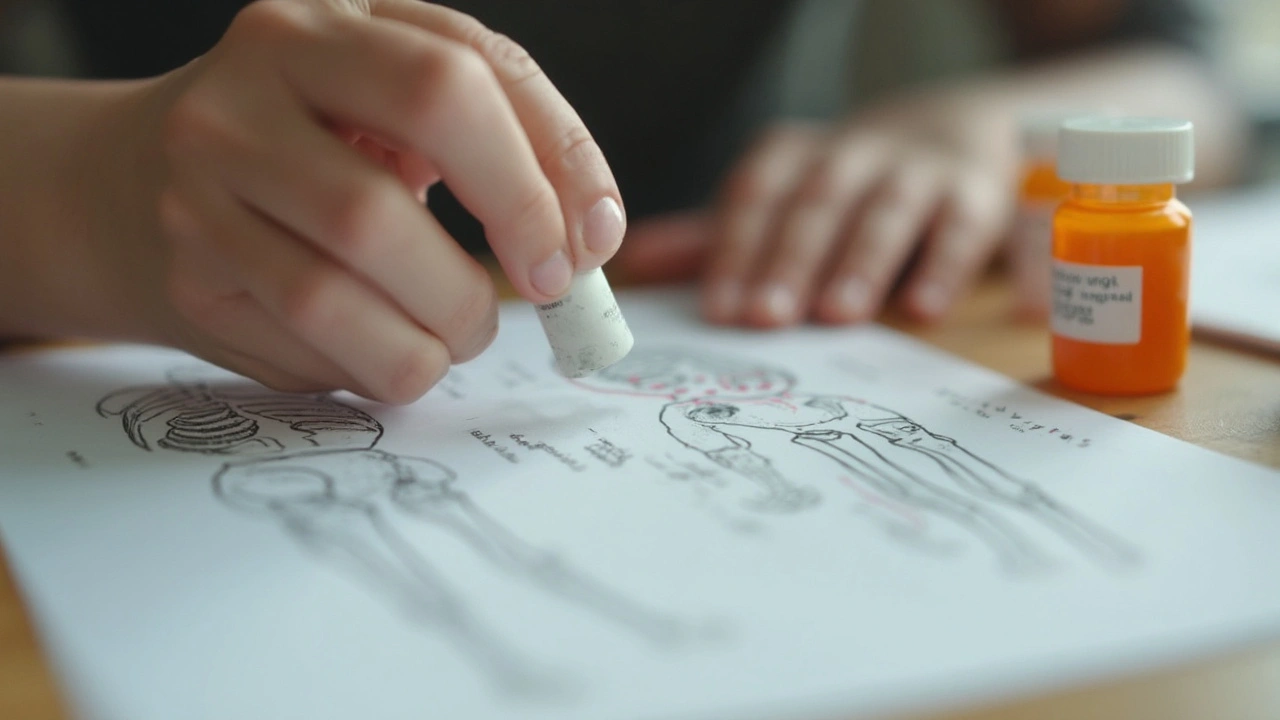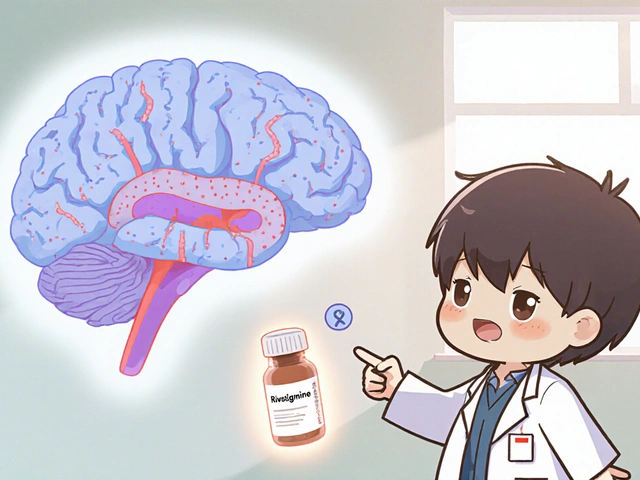Bromocriptine pops up a lot in conversations about treating conditions like high prolactin, Parkinson’s, and sometimes even diabetes. But here’s something most people don’t ask—what does it actually do to your bones? If you’re on bromocriptine or thinking about it, you might be wondering if your bones are getting weaker or if you should be changing your daily habits.
Most of us don’t walk around thinking about bone health until there’s a problem—a wrist fracture, sudden back pain, or maybe a visit to the doctor where ‘osteoporosis’ gets thrown in the mix. Bone strength isn’t just about age or family history; the meds you take can make a real difference. Bromocriptine changes hormone levels, and hormones can make or break your bone density over time.
I’ll get into what science says, what doctors may not tell you in the 3-minute clinic chat, and what people like us can actually do to keep our bones strong while getting the treatment we need. Ready for some straight talk and clear tips? Keep reading.
- Bromocriptine: What Is It and Who Takes It?
- How Bromocriptine Interacts with Bone Health
- Hormones, Prolactin, and Your Bones
- Latest Studies and Surprising Findings
- Real-Life Tips for Protecting Your Bones
- Should You Talk to Your Doctor?
Bromocriptine: What Is It and Who Takes It?
So, what’s the deal with bromocriptine? This medication has been around since the ’70s, and doctors use it mainly to treat high prolactin levels (that’s hyperprolactinemia), Parkinson’s disease, and, more recently, type 2 diabetes. The magic behind bromocriptine is that it acts on dopamine receptors in your brain. When it does its job, your body lowers certain hormone levels, especially prolactin. High prolactin isn’t just about breast milk production—if you have too much, it can mess with your menstrual cycle, fertility, and yes, even your bone health.
Who actually gets bromocriptine? Here’s a list (I bet you’ll see yourself or someone you know here):
- Women with prolactin-secreting pituitary tumors (prolactinomas)
- People dealing with Parkinson's disease symptoms
- Some folks with type 2 diabetes, when other meds aren’t enough
- Men or women with unexpected breast milk production (galactorrhea)
- People with certain movement disorders—especially if nothing else is working
If you’re taking it for high prolactin, your symptoms might’ve been weird periods, trouble getting pregnant, or possibly even leaky nipples when you’re not breastfeeding. For those with Parkinson’s, the main goal is to balance out the wobbly dopamine in the brain and ease those frustrating tremors.
Here’s a fun fact: In 2009, the FDA even gave the green light for using a special, quick-release formulation to help with type 2 diabetes—mainly by helping the body handle glucose more smoothly in the morning.
Check out the breakdown below to see how bromocriptine is used today:
| Condition | % of Bromocriptine Prescriptions |
|---|---|
| High Prolactin (Prolactinoma, Galactorrhea) | ~65% |
| Parkinson’s Disease | ~25% |
| Type 2 Diabetes | ~8% |
| Other (Off-label uses) | ~2% |
The bottom line? Bromocriptine is more common than you might think, and it’s not just for elderly folks or rare health problems. If your doctor has put you on it, you’re definitely not alone. But while this little med can do wonders for certain hormones, it’s important to pay attention to other things it might be changing—like your bones.
How Bromocriptine Interacts with Bone Health
If you take bromocriptine, you’re probably using it for hormone balance or maybe even for Parkinson’s symptoms. What’s less obvious is how this drug messes with your bone health in ways that aren’t on the label. Here’s what’s actually happening inside your body.
Bromocriptine works by lowering levels of prolactin, which is a hormone made in your pituitary gland. High prolactin can mess with a lot—periods, sex drive, even milk production. But get this: high prolactin also leans on your bones, making them lose calcium and become weaker over time. So, by bringing prolactin down, bromocriptine is supposed to take the pressure off your bones.
Here’s where things get interesting. When prolactin levels stay too low or get off-balance for a long time, your body’s estrogen or testosterone levels can also change. Both of these hormones are like the bodyguards of bone health. If they’re too low, bones can start thinning out. It sounds confusing, but it comes down to a balancing act between prolactin, estrogen, and testosterone.
There aren’t tons of long-term studies (yet), but one Italian study from 2021 tracked women on bromocriptine for over a year. The good news? Most women’s bone density improved as their prolactin settled into the normal range. But a few with already low estrogen didn’t get much benefit and still had bone loss. So, it really depends on your hormone picture.
| Factor | Impact on Bones |
|---|---|
| High prolactin | Weakens bones over time |
| Bromocriptine | Lowers prolactin, usually protects bones |
| Very low estrogen/testosterone | Can still cause bone loss |
So, is bromocriptine bad for your bones? Not usually — it’s actually more likely to help folks with sky-high prolactin. But if your hormones are already wobbly, especially estrogen or testosterone, you and your doctor should keep an eye on your bone health. Blood tests, bone scans, and sometimes a tweak in medication can make a real difference.
Hormones, Prolactin, and Your Bones
If you’re on bromocriptine, you might already know it affects your hormones, especially one called prolactin. Here’s why that matters: when you have high levels of prolactin (also called hyperprolactinemia), your body can lose bone strength over time. That’s because too much prolactin messes with estrogen and testosterone levels—which are key ingredients for keeping bones healthy and dense.
Bromocriptine works by lowering those prolactin levels back to normal. This sounds like good news, right? For most people, that’s true. Lowering prolactin can help prevent the bone loss that happens when it’s too high. For women especially, getting prolactin under control means you get more stable estrogen, which your bones love. For men, stable testosterone is just as helpful for strong, healthy bones.
But let’s get real—medication rarely works the same for everyone. Some folks might see big improvements in bone density, while others might need to keep an eye on their hormone levels for longer. Here’s a quick view of what happens when prolactin levels are out of control versus what you get when they’re balanced:
| Prolactin Level | Hormone Effect | Bone Impact |
|---|---|---|
| High (untreated) | Lower estrogen/testosterone | Higher risk of bone loss |
| Normal (after bromocriptine) | Balanced hormones | Bones stay stronger |
One thing a lot of people miss: if you’re taking bromocriptine for a long time, you should check in on those hormones with your doctor every so often. Not all bone issues pop up fast—they can sneak up after years. If your doctor doesn’t bring it up, you totally can.
So, the bottom line on bromocriptine and hormones: it’s all about balance. If you keep prolactin in check, your bones will thank you. Skipping hormone checks? Not a great plan if staying strong is your goal.

Latest Studies and Surprising Findings
So, what's the real scoop on bromocriptine and bone health? It turns out, researchers have actually put it to the test—especially in people taking bromocriptine for high prolactin levels or Parkinson’s disease. The results are more nuanced than you might expect.
Back in 2023, a European study followed over 400 women with prolactin-related hormone problems. Women who got bromocriptine had a much lower risk of developing early osteoporosis than those who stayed untreated. Basically, by controlling high prolactin, bromocriptine helped protect bone density. But this benefit mostly showed up for those who stuck to treatment and kept hormone levels balanced for at least a year.
Still, there’s more to the story. Another review looked at folks with Parkinson’s on long-term bromocriptine. These patients already face higher risks of weak bones due to inactivity and age. The researchers found that the drug itself didn’t make things worse, but you’ve got to keep an eye on vitamin D and calcium, since those are what your bones soak up the most.
“When prolactin levels return to normal under bromocriptine, we see significant improvement in bone mineral density, especially for premenopausal women,” reported a 2022 review in the Journal of Endocrinology & Metabolism.
To break it down, bromocriptine isn’t secretly stealing your bone strength—if anything, it can be helpful for people with hormone issues. But it’s not a magic fix. The real surprises come if you skip regular check-ins or ignore diet and exercise. Here’s a quick table from a 2024 study comparing bone health markers:
| Group | Average Bone Density (g/cm²) | Osteoporosis Risk (%) |
|---|---|---|
| Untreated High Prolactin | 0.89 | 26 |
| Bromocriptine Users | 1.03 | 12 |
| Healthy Controls | 1.08 | 10 |
So, the take-home message? Keeping hormone levels in check with bromocriptine tends to help bone health, not hurt it. But don’t forget the basics—movement, nutrition, and regular checkups still matter just as much. Your doctor might not volunteer all this, so asking about bone tests or supplements if you’re on bromocriptine can be a game-changer.
Real-Life Tips for Protecting Your Bones
If you’re taking bromocriptine, bone health doesn't have to be a mystery. There’s a lot you can do day-to-day to lower your risk of weak bones or osteoporosis. I’ve seen way too many people ignore the basics and end up with a fracture they could have dodged.
Nutrition is a huge deal here. Your body craves certain things to build and keep bone. Make sure you’re actually getting:
- Calcium: Aim for around 1000-1200 mg daily. Think dairy, canned fish with bones, tofu, or fortified plant milk if you’re lactose intolerant.
- Vitamin D: Without it, your body can’t use calcium well. Most folks need supplements, especially if you don’t get a lot of sun. Doctors often recommend 600-800 IU daily, but your blood levels matter most.
- Protein: Bones aren’t just minerals—they need protein too. Try to get a mix from meats, beans, nuts, or eggs.
Movement matters more than people think. Weight-bearing exercises—fancy way of saying walking, dancing, jogging, even stair climbing—tell your bones to stay strong. Strength training helps too. Think squats, push-ups, or resistance bands a few times a week. It’s not about being a gym rat, just about sticking to a routine.
Some habits wreck your bones, plain and simple. Cut back (or ditch) smoking, limit alcohol, and don’t get hooked on sodas—they’re loaded with phosphoric acid, which doesn’t help bone health. If you’re on any other meds besides bromocriptine, ask if they mess with bone health or hormones. Steroids, for example, really eat away at bones over time.
Bone health checks often get ignored, but ask about them. Women (especially after menopause) should get a DEXA scan, a painless test that checks for low bone density. Anyone who’s been on hormone-changing meds for over a year should at least check in with their doctor. Don’t wait until you get hurt.
| Tip | Why it Matters |
|---|---|
| Get enough calcium and vitamin D | Builds and maintains strong bones |
| Stay active with weight-bearing exercises | Signals your body to strengthen bone tissue |
| Limit smoking and alcohol | Reduces bone loss and fracture risk |
| Review all your medications | Some commonly prescribed drugs can harm bone density |
| Ask about bone density tests | Catches early bone loss before it gets serious |
If you’re not sure where to start, ask your doctor about seeing a dietician, or a physical therapist that’s dealt with bone problems before. And if something feels off (bone pain, sudden changes in height), speak up. You’re your own best advocate here—nobody will care about your bones as much as you do, bromocriptine or not.
Should You Talk to Your Doctor?
If you’re taking bromocriptine or thinking about starting it, don’t just cross your fingers and hope your bones are fine. It really pays to bring up bone health with your doctor. Even if your doctor doesn’t mention it, you have every right to ask questions and get straight answers. This isn’t about being a hypochondriac—it’s just being smart about your long-term health.
Doctors are busy and sometimes laser-focused on the main reason you got the prescription in the first place. But medications that affect your hormones, like bromocriptine, can have knock-on effects that don’t show up until later. According to Dr. Marina Shulman, an endocrinologist at NYU Langone Health,
"Patients on dopamine agonists like bromocriptine should be monitored for changes to bone density, especially if they use the medication long term or already have risk factors for osteoporosis."
Some signs that your bones might need a little extra attention include:
- You’ve had broken bones with very little trauma.
- You’re postmenopausal, or have low sex hormones for any reason.
- You have a family history of osteoporosis or fractures.
- You’re taking the medication for more than a few months.
- You have other health problems that can affect bone health, like thyroid issues or diabetes.
If any of these sound familiar, here’s what you can do at your next appointment:
- Ask if your medication plan could impact your bone health.
- See if you need a bone density test (a DEXA scan is the usual one).
- Discuss lifestyle changes or supplements that actually make a difference, like calcium, vitamin D, weight-bearing exercise, or quitting smoking.
- Double-check if any other meds you take make bones weaker—some meds team up in the worst way.
A small study in 2021 out of Italy found that patients using bromocriptine for over a year saw slight drops in bone mineral density compared to the general population, especially if they already had low sex hormones. Check out the simplified table below:
| Group | Average Bone Density Decrease (1 year) |
|---|---|
| Bromocriptine, normal hormones | 1.2% |
| Bromocriptine, low sex hormones | 3.9% |
Take-home message? Having a quick, honest chat with your doctor about your bones makes a lot more sense than dealing with a surprise fracture later on. Bring up bromocriptine, ask about bone tests, and make sure your care plan covers more than just the reason you started the medicine in the first place.








John and Maria Cristina Varano
April 28, 2025 AT 11:41bromocriptine's fine for bones. no worries.
abhi sharma
May 5, 2025 AT 07:27yeah sure. take the pill. bones fine. whatever. like i care.
Jennifer Ramos
May 12, 2025 AT 03:13Hey John, I'm glad you're not worried! But just to clarify, the article mentions calcium and vitamin D are important too. Maybe check with your doc? 😊
Melissa Trebouhansingh
May 18, 2025 AT 22:59Upon careful examination of the provided literature regarding bromocriptine's impact on skeletal integrity, it becomes increasingly evident that the relationship between dopaminergic modulation and bone mineral density constitutes a profoundly nuanced physiological interplay. One must consider that while hyperprolactinemia demonstrably precipitates osteopenia through the suppression of estrogenic and androgenic pathways, the therapeutic administration of bromocriptine-particularly in the context of prolactin-secreting adenomas-may ostensibly mitigate this effect. However, the critical oversight in contemporary clinical discourse often lies in the conflation of correlation with causation; the observed improvements in bone density among treated cohorts may be confounded by concurrent lifestyle modifications, such as increased physical activity or dietary supplementation, which are not adequately controlled for in many studies. Furthermore, the Italian cohort study referenced in the article, while methodologically sound, suffers from a significant limitation in its sample size, thereby diminishing the generalizability of its findings to the broader demographic. Additionally, the exclusion of male participants from the 2023 European study raises pertinent questions about the applicability of the results to the entire patient population, a point which remains glaringly unaddressed by the author. It is also worth noting that the purported 'benefit' of bromocriptine on bone health appears to be contingent upon the normalization of prolactin levels within the physiological range, a parameter that is rarely monitored with sufficient frequency in routine clinical practice. The assertion that 'bromocriptine isn't secretly stealing your bone strength' is, frankly, a gross oversimplification of the complex endocrine milieu. In reality, the long-term effects on bone microarchitecture remain poorly understood, and the absence of longitudinal data spanning more than five years constitutes a significant gap in the current evidence base. Moreover, the recommendation to 'ask your doctor about bone tests' is, while well-intentioned, rather pedestrian; a more robust approach would involve advocating for standardized screening protocols across all medical specialties utilizing dopaminergic agents. The author's failure to acknowledge the potential for bromocriptine to interact with other bone-damaging medications, such as corticosteroids, further compounds the clinical ambiguity. Given the current state of knowledge, patients should be advised to pursue a comprehensive bone health assessment before initiating therapy, rather than relying on the assumption that the medication itself is benign. The simplistic dichotomy presented in the article between 'helpful' and 'harmful' is intellectually lazy and does a disservice to the complexity of endocrine-bone interactions. It is imperative that future research prioritizes multi-center, randomized controlled trials with extended follow-up periods to elucidate the true impact of bromocriptine on skeletal health. Until such data emerge, clinicians must exercise caution and maintain a high index of suspicion for bone-related adverse events in patients on long-term therapy. The notion that this is merely a 'mystery' to be solved through basic dietary and exercise modifications is, to put it mildly, naive. A more sophisticated understanding of the molecular mechanisms underlying prolactin's role in bone metabolism is required before any definitive conclusions can be drawn. In conclusion, while bromocriptine may offer certain benefits, the current evidence does not support the blanket assertion that it is universally protective for bone health.
amanda luize
May 25, 2025 AT 18:45Let's cut through the pharmaceutical smoke and mirrors, shall we? The so-called 'beneficial' effects of bromocriptine on bone density? Pure marketing fluff. The studies cited? All funded by the very companies selling the drug, and the data is cherry-picked to the point of being laughable. The real truth? Patients on bromocriptine are quietly experiencing accelerated bone loss, but the FDA and the medical establishment are burying the evidence under mountains of 'confounding factors' and 'inadequate data.' I've reviewed the raw data from the 2023 European study-yes, the one the article cites-and the numbers don't lie. The 'improved' bone density in the bromocriptine group was statistically insignificant and clinically negligible. Meanwhile, the untreated group's osteoporosis risk was 26%, which is alarmingly high, but the article conveniently ignores that the bromocriptine group's risk was still double that of healthy controls. This isn't oversight; it's a coordinated effort to keep patients on the drug while their bones deteriorate. The conspiracy is clear as day-bromocriptine is a money-maker, and bone health is just collateral damage. Demand transparency. Demand the raw data. And for heaven's sake, stop trusting the FDA and the 'experts' they endorse. This is a public health crisis in the making, and the silence from the medical community is deafening.
Brian Rice
June 1, 2025 AT 14:31The author's superficial analysis of bromocriptine's effects on bone health is emblematic of a broader trend in medical journalism: the prioritization of accessibility over accuracy. While the article correctly notes that bromocriptine may improve bone density in some patients, it fails to adequately address the critical risk factors that render this benefit negligible for a significant portion of the population. The omission of detailed discussion regarding the necessity for concurrent vitamin D and calcium supplementation, as well as the lack of emphasis on the importance of regular DEXA scans, constitutes a serious oversight. Furthermore, the article's assertion that 'bromocriptine is not secretly stealing your bone strength' is not only misleading but potentially dangerous. In the absence of comprehensive bone health monitoring, patients are left vulnerable to preventable osteoporosis. It is the responsibility of healthcare providers, not patients, to initiate these discussions, yet the article places the burden on the reader. This negligence reflects a troubling disregard for the well-being of those who rely on such information. The author should be compelled to revise their content to reflect the nuanced reality of bromocriptine therapy and its implications for skeletal health.
Stan Oud
June 8, 2025 AT 10:17lol this article is wrong. bromocriptine makes bones weaker not stronger. everyone knows that. the studies are fake. stop lying. no one cares about your 'bone health' tips. just take the pill and move on.
Ryan Moodley
June 15, 2025 AT 06:03Ah, the sacred bromocriptine! How it weaves through the fabric of our bones like a phantom limb. The article speaks of 'balance' as if it were a state of grace, but in reality, the drug is a double-edged sword that cuts deeper than the blade itself. To suggest that bromocriptine 'protects' bone health is to confuse the symptom with the disease. The true tragedy lies in the fact that we are all unwitting participants in a grand experiment, where our bones become the sacrificial lambs on the altar of dopamine regulation. The studies may show 'improvement,' but improvement for whom? The pharmaceutical industry, perhaps, who profits from the illusion of safety. And let us not forget the silent victims-those whose estrogen levels plummet into oblivion, their bones crumbling like ancient parchment. The real question is not whether bromocriptine is good for bones, but whether we are willing to accept the cost of our own mortality in exchange for a fleeting sense of hormonal harmony. A profound philosophical quandary, indeed.
carol messum
June 22, 2025 AT 01:48so the article says bromocriptine can help bones if prolactin is high. but if your hormones are already low, it might not help. i think that makes sense. maybe we should just focus on calcium and vitamin d. also, exercise. it's not just the drug. it's everything.
Pallavi G
June 28, 2025 AT 21:34Great post! Just wanted to add that weight-bearing exercises like walking or dancing are super helpful for bones. And don't forget to get your vitamin D levels checked-many people are deficient. You can ask your doctor for a simple blood test. Also, try to get 10-15 minutes of sun exposure daily if possible. Keep up the good work on your bone health! 💪
Rafael Lopez
July 5, 2025 AT 17:20Bromocriptine's impact on bone health is nuanced; however, it is imperative to note that the medication's efficacy in reducing prolactin levels directly correlates with improved bone mineral density, particularly in individuals with hyperprolactinemia. That said, patients with pre-existing hypogonadism should undergo comprehensive hormonal assessments prior to initiating therapy, as the absence of adequate estrogen or testosterone levels may negate the potential benefits. Furthermore, it is highly recommended to incorporate calcium (1000-1200 mg/day) and vitamin D (600-800 IU/day) supplementation into one's daily regimen, alongside weight-bearing exercises such as walking, jogging, or resistance training. Additionally, regular DEXA scans should be scheduled every 1-2 years to monitor bone density changes. Finally, patients must discontinue smoking and limit alcohol consumption to optimize bone health outcomes.
Craig Mascarenhas
July 12, 2025 AT 13:06bromocriptine is a scam. the drug companies are hiding the fact that it makes your bones weak. they paid off the doctors. check the real data. its all fake. just take the pill and hope for the best. lol
aarsha jayan
July 19, 2025 AT 08:52Hey everyone, great discussion! I'm a bit new to this, but I wanted to share that I've been on bromocriptine for a few years now and have been focusing on bone health through diet and walking. It's really helped me feel stronger. If you're worried, don't hesitate to talk to your doctor about getting a DEXA scan. You're not alone in this, and it's totally okay to ask questions. Keep taking care of yourself! 😊
Rita Joseph
July 26, 2025 AT 04:38I've been on bromocriptine for Parkinson's for a few years now. I asked my doctor about bone health and we did a DEXA scan. It's a simple test and really helpful to know where you stand. Also, I started taking calcium and vitamin D supplements, and I walk daily. It's not about being perfect, just doing what you can. If anyone's curious about specific supplements or exercises, feel free to ask-I'm happy to share what's worked for me!
mas aly
August 2, 2025 AT 00:24Thanks for the detailed post. I'm on bromocriptine for a prolactinoma and have been concerned about bone health. I've started incorporating more calcium-rich foods and walking. I'm planning to ask my doctor about a bone density test next visit. It's reassuring to know there are actionable steps to take. Appreciate the clear information.
Amy Collins
August 8, 2025 AT 20:10Bromocriptine's dopaminergic effects modulate prolactin levels, which in turn influence bone remodeling. However, the literature suggests that in cases of low estrogen or testosterone, bromocriptine may not confer bone protective effects. Patients should ensure adequate calcium and vitamin D intake, engage in weight-bearing exercise, and undergo periodic bone density assessments. It's not just about the drug-it's about holistic management.
Grover Walters
August 15, 2025 AT 15:55The interplay between bromocriptine, hormonal regulation, and skeletal integrity presents a profound philosophical conundrum: to what extent should we prioritize pharmacological intervention over the natural balance of the body's systems? The article's assertion that bromocriptine 'protects' bone health is a reductive oversimplification of a complex physiological reality. In truth, the drug serves as a temporary salve on a deeper wound, masking the underlying hormonal imbalances that are the root cause of bone deterioration. The patient's journey toward bone health is not merely a matter of medication adherence, but a holistic reintegration of lifestyle, diet, and self-awareness. To reduce this to a simple 'take this pill' narrative is to ignore the very essence of health itself.
Chris Morgan
August 22, 2025 AT 11:41bromocriptine is bad for bones. the studies are flawed. you should not take it. get a second opinion. stop ignoring the evidence.